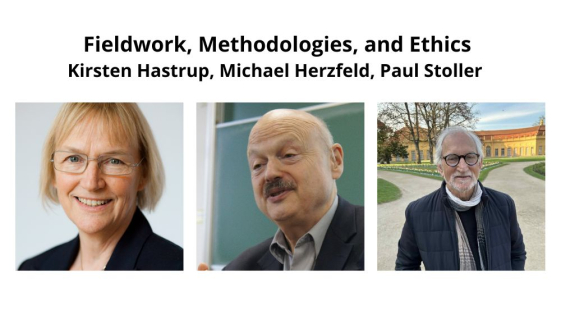Fieldwork, Methodologies, and Ethics
Zapraszamy na otwarte seminarium (w języku angielskim), na którym wystąpią Kirsten Hastrup (Uniwersytet Kopenhaski), Michael Herzfeld (Uniwersytet Harvarda) i Paul Stoller (FAU Erlangen-Nuremberg; Uniwersytet Pensylwanii).

Presentations:
The Ethical Dilemmas of Ethnography
Michael Herzfeld
Anthropologists face many ethical dilemmas in fieldwork. In recent years they have been subjected to forms of bureaucratic surveillance. These, while useful as a reminder of our moral obligations, are often themselves of questionable ethical value, and may in some situations appear to be actually unethical. The speaker will address these issues from the perspective of his fieldwork in Greece, Italy, and Thailand, and will suggest robust ethical defense strategies in the face of administrative overkill.
Paths to a Convivial Anthropology
Paul Stoller
Disciplinary socialization has long shaped how scholars understand the world. Like other scholars, anthropologists have been conditioned by long-standing disciplinary traditions that have structured their methods, the questions they ask, and the texts they write. In this essay, I describe how my anthropological training compelled me to write the first draft of my book, In Sorcery’s Shadow, as a traditional academic text—introduction, literature review, results, discussion, and conclusion. When I completed the first draft, I was not comfortable with the format of the text. Given that I had a great deal of love and respect for my mentor, Adamu Jenitongo, a renowned healer among the Songhay people of Niger and Mali, I wanted to hear his thoughts about what I had written. So I traveled to Niger. Over two months of late-night sessions, I translated the manuscript for him. Ultimately, he did not like my text, saying that I should write about the development of our relationship. This critique has shaped my subsequent research and writing. I eventually discarded the expected writing formats. What emerged was a memoir describing how learning about sorcery—or anything anthropological-- evolves from longstanding relationships built upon bonds of trust. Ultimately, the intricacies and intimacies of human relations, which devolve from love and loss, have important ethical implications for contemporary social science. They bring us closer to a deeply rewarding convivial anthropology.
Anthropological Landscapes. Provoking — Ruined — Authorised
Kirsten Hastrup
From extensive work in Iceland and High Arctic Greenland, I have come to see landscapes as integral parts of the communities, in which people organize themselves. In both of these fields I have worked historically with ethnography, and ethnographically with history. This implies that one must take history and nature equally seriously. Hence the “Anthropological Landscapes”.


